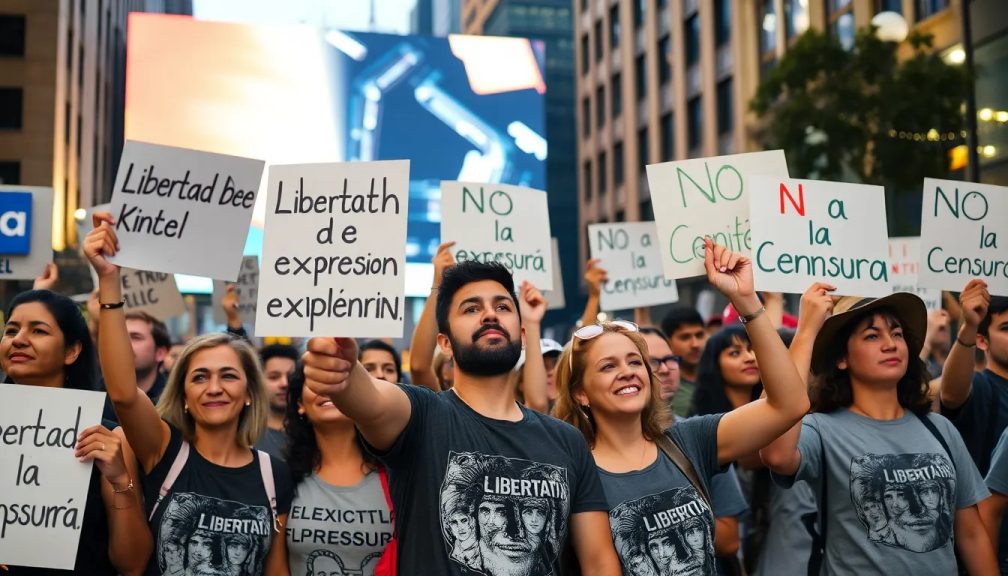Kimmel censorship incident highlights the importance of protests

The recent controversy surrounding Jimmy Kimmel has illuminated the delicate balance between free speech and governmental influence in modern media. As public figures face the repercussions of their words, the vital role of public protest becomes evident, highlighting how collective action can influence media narratives and corporate decisions. In this article, we will delve deeper into the implications of Kimmel's situation, the reactions it has sparked, and the broader context of censorship in today's society.
Understanding disfavored speech in America
Justice Sonia Sotomayor articulated a crucial principle regarding free speech: the government cannot punish individuals or organizations simply for expressing unpopular opinions. This sentiment is foundational in maintaining the integrity of free speech within a democracy.
This principle was reaffirmed in a 2024 Supreme Court ruling that underscored the importance of protecting all speech, regardless of its popularity. Yet, the reality in contemporary America illustrates a worrying trend where voices critical of the government or powerful interests face increasing censorship.
For instance, Brendan Carr, the Chair of the Federal Communications Commission, has been vocal about the need for transparency regarding governmental pressure on media outlets. He previously stated:
“If a social media company gets pressured by a government official to censor protected speech, the company should quickly disclose that request.”
This perspective highlights an essential aspect of free speech: the need for accountability and transparency when it comes to governmental influence over media platforms.
The Kimmel controversy explained
The recent uproar surrounding Kimmel began when he made comments that did not sit well with government officials, particularly Carr, who issued ominous warnings about potential repercussions for media companies that continued airing Kimmel's show. His remarks included:
“We can do this the easy way or the hard way. These companies can find ways to change conduct regarding Kimmel, or there will be additional work for the FCC ahead.”
This statement raised alarms about the implications of government officials attempting to dictate media content. Such actions can create a chilling effect, where media companies might self-censor to avoid punitive actions from the government.
Public outcry and protest movements
In response to Kimmel's suspension, a significant backlash emerged, illustrating the power of public protest. High-profile figures from various sectors rallied to defend Kimmel’s right to speak freely. Notable celebrities like Tom Hanks, Meryl Streep, and Lin-Manuel Miranda signed an open letter opposing the censorship, stating:
“Efforts by leaders to pressure artists, journalists, and companies with retaliation for their speech strike at the heart of what it means to live in a free country.”
This collective action serves as a reminder that public figures can use their platforms to advocate for free speech and challenge government overreach. Their influence can be pivotal in shaping public opinion and fostering a culture that values open dialogue.
Moreover, ordinary citizens also began to express their discontent with corporate decisions by canceling subscriptions to Disney+ and Hulu. This grassroots movement highlighted the importance of consumer power in holding companies accountable. Examples of this include:
- Y Combinator founder Paul Graham publicly canceled his Disney+ subscription, criticizing the network for capitulating to government pressure.
- Comedian John Oliver encouraged his audience to boycott Disney, emphasizing the necessity for the company to stand by Kimmel.
- Social media users began sharing screenshots of their subscription cancellations to amplify their protest.
Corporate responses and implications
Media companies are acutely aware of the potential consequences of government influence, particularly when they have pending mergers or regulatory approvals before the FCC. For instance, Paramount recently paid $16 million to settle a lawsuit linked to political content, coinciding with its merger proceedings. Such financial decisions raise questions about the integrity of media operations in politically charged environments.
Nexstar and Sinclair, both influential broadcasting groups, were also implicated in Kimmel's suspension. Their actions and public statements suggest that corporate interests may override journalistic integrity under pressure from government entities:
- Nexstar claimed its decision to limit Kimmel’s airings had no connections to Carr's remarks, despite the company being in line for FCC approval for a significant acquisition.
- Sinclair, known for its right-leaning media stance, openly supported Carr’s comments and called for Kimmel to apologize to specific political figures.
The implications for freedom of speech
The Kimmel incident and its aftermath illuminate the fragile state of free speech in America. As the government increasingly attempts to control narratives, the role of protest becomes more critical. The backlash against Kimmel's suspension is a testament to the power of collective action in resisting censorship.
As citizens and public figures unite to protect free speech, it raises important questions about:
- The extent of governmental influence in media.
- The responsibility of corporations to uphold free speech.
- The effectiveness of public protest in enacting change.
The future of late-night television and beyond
The suspension of Kimmel highlighted the precarious nature of late-night television, where hosts often critique political figures and policies. The potential for similar actions against other comedians raises concerns about the future of comedic expression in the media landscape.
In a surprising turn of events, Disney eventually announced Kimmel's reinstatement after considerable public pressure, stating it would air his show again. However, the conditions surrounding this decision remain uncertain:
- Will all affiliates choose to air the show, or will some continue to heed government warnings?
- What will be the long-term implications for Kimmel and other late-night hosts in their ability to speak freely?
In a world where government censorship looms large, the case of Jimmy Kimmel serves as a reminder of the importance of protecting free speech. The backlash against his suspension showcases that public protest still holds power and that individuals can influence corporate decisions when standing united against injustice. As we reflect on these events, it becomes clear that sustaining the fight for free speech is essential for a thriving democracy.




Leave a Reply